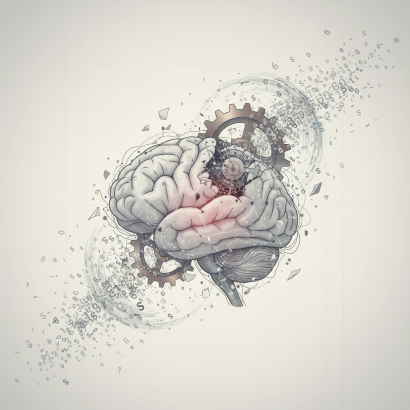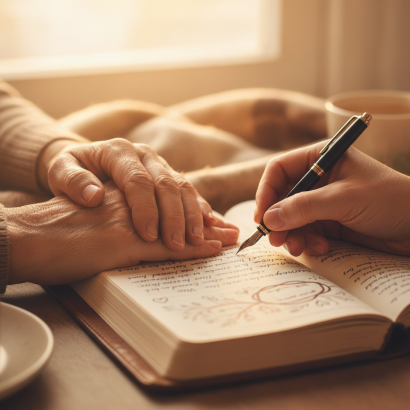The Weight of Money Fear
Many of us have known that feeling: the quiet panic that sits in the chest when we think about money. Sometimes it comes late at night, when the room is dark and silent, and even more when we are lonely. The mind starts listing bills, debts, and unfinished goals. Sometimes it comes during the day, hidden beneath a polite smile, when someone mentions their new car, or a friend talks about an investment they made. It’s not just about money itself. It’s about safety, control, and the deep human need to feel that our future is secure.
Financial anxiety has quietly become one of the modern world’s most common emotional struggles. We don’t always talk about it, but it’s there every moment within all of us: in the tension we feel before opening a banking app, in the guilt after a small indulgence, in the constant comparison that social media fuels.
For many of us, money has become more than paper or digits. It has become a mirror of self-worth. When we have it, we feel confident and in control. When we lose it, we feel lost, exposed, and sometimes even ashamed. I’ve come to realize that our relationship with money often reflects our relationship with ourselves: our fears, our hopes, and our need to belong.

The Mind Behind the Numbers
To understand why financial anxiety is so powerful, we need to look inside the mind itself.
The human brain wasn’t built for the modern financial world. It evolved thousands of years ago to ensure survival: to detect threats, conserve energy, and seek security. Money, in many ways, has become today’s version of food or shelter. It represents safety in an uncertain world.
When we fear losing money or not having enough, our brain responds as if we were in physical danger. The amygdala, the brain’s emotional alarm system, lights up. It releases stress hormones like cortisol and adrenaline, preparing us to fight or flee. But unlike a physical threat, financial worries have no clear endpoint. You can’t punch your bills or run away from your student loans. The anxiety lingers, looping endlessly through the mind.
What makes it worse is that our brain rewards us for temporary relief. When we buy something impulsively, a small burst of dopamine gives us comfort. But soon after, the guilt returns, and we find ourselves trapped in a cycle: worry, spend, regret, repeat.
This is how the psychology of scarcity begins. When we constantly feel there isn’t enough (not enough money, time, opportunity), the brain narrows its focus. It becomes reactive, emotional, and short-sighted. We stop planning for the future and start making decisions just to ease the discomfort of the present. That’s why financial anxiety doesn’t only hurt our peace of mind; it also quietly sabotages our long-term growth.

The Silent Toll on Our Body and Mind
Financial stress doesn’t stay in our thoughts. It seeps into our body. Studies have shown that chronic money-related worry is linked to higher blood pressure, insomnia, digestive issues, and even weakened immunity. But beyond biology, it affects how we see the world.
When we’re anxious, the mind’s lens becomes distorted. We begin to interpret everything through the filter of fear. A delay in salary feels like disaster. A sudden expense feels like failure. Even opportunities begin to look like risks. Slowly, this state of alertness becomes our normal.
We start avoiding financial conversations, delaying decisions, or obsessing over every small transaction. Some of us become hyper-savers, trying to control every rupee to feel safe. Others become avoiders, pretending the problem isn’t there at all. Both are expressions of the same wound: the need to protect ourselves from a feeling of helplessness.

The Stories We Tell Ourselves
Beneath every financial behavior lies a money story: a belief we absorbed early in life about what money means.
Maybe we grew up hearing that “money doesn’t grow on trees,” or that “rich people are greedy.” Maybe our parents fought over bills, or maybe we saw them sacrifice every comfort to save. Whatever the case, those early messages shaped the emotional blueprint of how we see money today.
Psychologists call these patterns money scripts: unconscious beliefs that drive our choices. Some people develop a “money worship” script, believing that more money will solve all problems. Others develop “money avoidance,” believing that money is the root of conflict or guilt. These beliefs aren’t facts; they’re emotional imprints.
When I began understanding this, I realized that healing financial anxiety isn’t only about budgeting or earning more. It’s about rewriting those inner scripts. We have to separate our self-worth from our net worth. We have to remind ourselves that financial stability grows from awareness, not from fear.
One of the hardest truths I’ve learned is that no amount of money feels “enough” when the mind is trapped in scarcity. The feeling of “not enough” doesn’t come from the wallet; it comes from the wound. And healing that wound begins with awareness.
Healing Financial Wounds
Healing begins quietly, not with spreadsheets, but with self-compassion.
When you catch yourself worrying about money, pause and breathe. Instead of judging yourself, try to observe the thoughts as they are: stories the mind is repeating to feel in control. Financial anxiety often grows in the dark; the moment we bring it into awareness, its power begins to fade.
The first step is understanding your emotional triggers. What situations make you feel unsafe? Is it checking your account balance? Seeing others achieve more? Not being able to save as much as you hoped? Notice them gently. Awareness doesn’t fix them instantly, but it breaks the automatic pattern of reaction.

The second step is creating a sense of safety, even in small ways. Your nervous system needs proof that you can handle uncertainty. Start with small financial wins: saving a little each week, paying off one small bill, or simply organizing your finances with clarity. Each act, no matter how small, signals your brain that you’re taking charge.
The third step is to rewrite the narrative.
Whenever you hear the voice in your head that says, “I’ll never be good with money,” or “I’m behind everyone else,” question it. Whose voice is that? Where did it come from? You can replace it with a gentler truth: “I’m learning,” “I’m improving,” “I’m growing.” Self-talk, over time, becomes self-trust.
Learning to Breathe Again
One of the most powerful yet underrated practices in overcoming financial anxiety is mindful detachment. This doesn’t mean carelessness; it means recognizing that your worth isn’t attached to numbers.
Try this: sit quietly, close your eyes, and imagine your worries about money as waves. Watch them rise, peak, and fade. They may come back, but notice that you are not the waves; you are the ocean that holds them. This small shift from identification to observation can be life-changing.

Another healing practice is gratitude, not as a cliché, but as a reprogramming tool for the brain. Anxiety thrives on scarcity. Gratitude gently reminds the brain that there is already “enough.” Start noticing the everyday forms of abundance around you: a meal, a roof, someone who cares, a skill you’ve developed. Gratitude doesn’t deny problems; it creates the emotional balance needed to face them with clarity.
And then comes community.
Financial anxiety isolates people because money is still a taboo topic. We share our heartbreaks more easily than our financial struggles. But the truth is, everyone has gone through money stress in some form. Talking about it (with a trusted friend, mentor, or support group) breaks the shame cycle. It turns isolation into understanding.
Redefining What Wealth Means
As I’ve grown through my own experiences and through studying psychology, I’ve come to see that true wealth is emotional peace. You can have a healthy bank balance and still feel poor inside if your mind is constantly at war with itself.

Wealth is not just about accumulation; it’s about alignment: living in harmony with what truly matters to you. When your values, spending, and goals begin to align, the constant anxiety begins to dissolve. You stop chasing security outside because you begin to feel it within.
This shift changes how you handle everything: your work, your relationships, your self-worth. You begin to approach money as a tool, not a test. You start to realize that contentment isn’t found at a number; it’s found in a state of mind.
Walking the Path of Healing
Healing from financial anxiety is not a single decision. It’s a series of small, brave choices made in quiet moments: when no one is watching, when the world is still, and your thoughts are loud. It’s not about fixing everything at once. It’s about learning to sit with discomfort without letting it define you.
You begin by noticing. Noticing the tightness in your chest when you think about bills. Noticing the stories that play in your mind: “I’ll never catch up,” “I’m not good with money,” “I’m falling behind.” Keep reminding yourself that these thoughts aren’t facts; in fact, this merely might not even be your reality. They’re just echoes of past experiences, shaped by fear, shame, or scarcity. And the moment you notice them, you create a space between you and the story. That space is where healing begins.
Then comes the practice of naming. Name the emotion. Say it out loud or write it down: “I feel anxious,” “I feel ashamed,” “I feel overwhelmed.” Naming your emotions doesn’t make them stronger; it makes them less mysterious. Neuroscience shows that labeling emotions helps regulate the brain’s fear response. It’s like turning on a light in a dark room. Suddenly, what felt like a monster becomes something you can understand, and eventually, soothe.
After naming, comes befriending. This is the hardest part. We’re taught to fight our anxiety, to push it away, to “just be positive.” But what if, instead, you sat with it? What if you asked your anxiety what it’s trying to protect you from? Often, it’s not trying to hurt you. It’s trying to keep you safe: from failure, from judgment, from the unknown. When you treat your anxiety like a frightened child rather than an enemy, something softens. You stop being at war with yourself.
And then, slowly, you begin to rewire. This is where psychology meets practice. You start to replace reactive habits with intentional ones. You create a simple budget: not to restrict yourself, but to feel clarity. You set up a small emergency fund: not because you expect disaster, but to remind your nervous system that you’re prepared. You track your spending: not to punish yourself, but to become aware of your patterns. Awareness is the first step to freedom.
You also begin to challenge your money beliefs. Ask yourself: What did I learn about money growing up? What did I see, hear, absorb? Which of those beliefs still serve me, and which ones are keeping me stuck? Maybe you were taught that money is always scarce, or that wanting more is selfish. Maybe you learned that asking for help is weakness. But you’re allowed to rewrite those scripts. You’re allowed to believe that money can be a tool for good, that you are worthy of abundance, that support is strength.
And as you do this inner work, you start to notice something subtle but powerful: your self-trust grows. You begin to believe that you can handle what comes. That even if you make a mistake, you’ll learn. That even if you fall, you’ll rise. This is the foundation of true financial peace: not the absence of problems, but the presence of resilience.
Creating Rituals of Safety
Healing also lives in the body. Financial anxiety isn’t just a thought; it’s a sensation. So create rituals that remind your body it is safe. Light a candle when you sit down to review your finances. Play calming music. Breathe deeply. Keep a small object nearby (a stone, a photo, a note) that reminds you of your strength. These may seem small, but they anchor your nervous system. They tell your body, “We’re okay. We’re doing this together.”
You can also create emotional rituals. Write a letter to your younger self, forgiving them for the financial mistakes they didn’t know how to avoid. Write a letter to your future self, promising to show up with more compassion and courage. Keep a “proof journal”: a notebook where you record every small win: “I paid a bill on time,” “I said no to an impulse buy,” “I asked for help.” These are not small things. These are acts of healing.
Letting Others In
One of the most radical things you can do in your healing journey is to let others in. Financial anxiety thrives in silence. It tells you that you’re the only one struggling, that everyone else has it figured out. But the truth is, so many people carry this quiet burden. When you share your story (even just a piece of it) you break the illusion of isolation.
Find someone you trust. A friend, a therapist, a support group. Say, “I’ve been feeling anxious about money.” You don’t need to have all the answers. You just need to be honest. Vulnerability is not weakness; it’s the doorway to connection. And connection is one of the most powerful antidotes to anxiety.
Redefining Success
As you walk this path, you may begin to redefine what success means to you. Maybe it’s not about a certain income or a perfect credit score. Maybe it’s about waking up without dread. Maybe it’s about feeling proud of how you handled a tough month. Maybe it’s about knowing that your worth is not tied to your wallet.
True wealth is the ability to breathe deeply and freely. To sleep peacefully. To make choices from a place of alignment, not fear. To know that you are enough: not someday, not when you hit a goal, but now.

A Gentle Closing
So if you’re reading this and your chest feels heavy, if your mind is racing with numbers and what-ifs, I want you to know: you are not broken. You are not behind. You are not alone.
You are a human being with a tender heart, living in a world that often confuses value with valuation. But your worth is not a number. It never was.
You are allowed to take your time. You are allowed to heal slowly. You are allowed to feel afraid and still move forward.
And one day (maybe not today, maybe not tomorrow) you’ll notice that the fear has softened. That the voice in your head is kinder. That you can open your banking app and feel calm. That you can make a decision without spiraling. That you can breathe.
That is freedom.
And it’s already unfolding within you.
If you’ve read this till the end, thank you❤️
With love,
Your Dearest Friend,
Chitraansh







